
Subscribe
eNewsletter

Ready to get certified?
Free CDCES Coach App
Download
Free Med Pocket Cards

Be a part of our diabetes community while learning about the latest in diabetes care. Plus, Coach Beverly provides an interactive question and answer session at the end of each live webinar.

Topics:
Keeping all the behavior change and learning theories straight can be daunting, especially if you are trying to get to the “best” answer for certification exams. Coach Beverly feels your pain and wants to help out. To say thanks for 25 years, she’s hosting a FREE Behavior Change Webinar to sort out and dissect the theories most relevant in clinical practice and for exam preparation.
Can’t make it live? No worries. We will send post the recorded version to the Online University within 24 hours of the broadcast
Instructor: Beverly Thomassian RN, MPH, CDCES, has been Board Certified in Advanced Diabetes Management for over 20 years. She is an Associate Clinical Professor at UCSF, a working educator, and a nationally recognized diabetes expert. She has a Master’s Degree in Public Health from UCLA, with a focus on behavioral health and education.
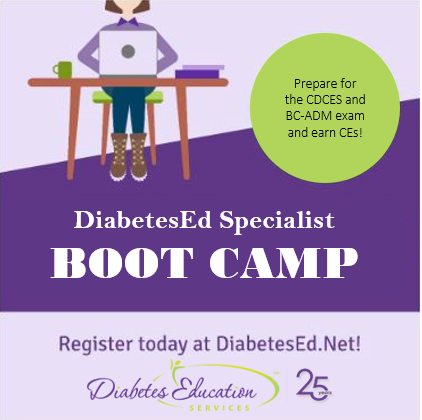
Class Topics & Webinar Dates:
Intended Audience: This library of critical information is designed for individuals or groups of diabetes specialists, including RNs, RDs, Pharmacists, Nurse Practitioners, Clinical Nurse Specialists, Physician Assistants, and other health care providers interested in staying up to date on current practices of care for people with diabetes and preparing for the BC-ADM or the CDCES certification Exam.
Can’t make it live? No worries. We will send post the recorded version to the Online University within 24 hours of the broadcast
Instructor: Beverly Thomassian RN, MPH, CDCES, has been Board Certified in Advanced Diabetes Management for over 20 years. She is an Associate Clinical Professor at UCSF, a working educator, and a nationally recognized diabetes expert. She has a Master’s Degree in Public Health from UCLA, with a focus on behavioral health and education.
Christine Craig, MS, RD, CDCES, winner of the 2023 Impact on Diabetes Award, is a leader in the field of nutrition, technology, and diabetes care. Her years of expertise combined with her person-centered approach and work ethic, make her a perfect speaker for this nutrition and activity focused content.
Sign up for Diabetes Blog Bytes – we post one daily Blog Byte from Monday to Friday. And of course, Tuesday is our Question of the Week. It’s Informative and FREE! Sign up below!
Accreditation: Diabetes Education Services is an approved provider by the California Board of Registered Nursing, Provider 12640, and our CPEU courses have received Prior Approval* from the Commission of Dietetic Registration (CDR), Provider DI002. Since our CPEU courses received Prior approval* from the CDR, these CPEU courses satisfy the CE requirements for the CDCES /BC-ADM regardless of your profession!
The use of DES products does not guarantee the successful passage of the certification exam. CBDCE and ADCES do not endorse any preparatory or review materials for the CDCES or BC-ADM exams, except for those published by CBDCE & ADCES.

Food insecurity affects 16% of adults with diabetes compared with 9% of adults without diabetes.
Based on the ADA standards of care, which is the most accurate statement regarding food insecurity and people with diabetes?
Click Here to Test your Knowledge
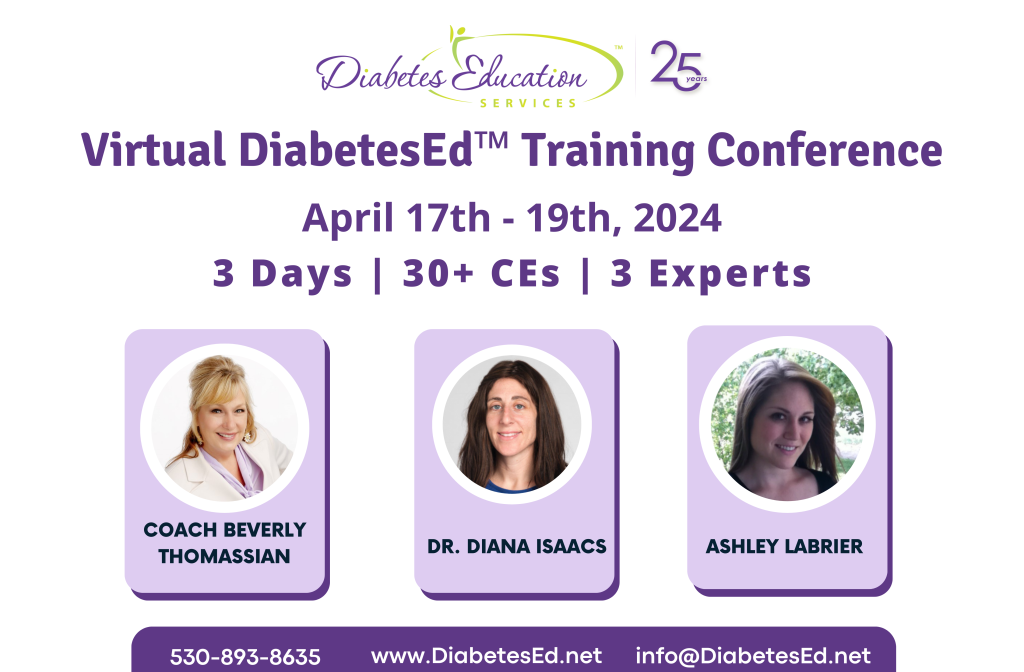
Join Coach Beverly and Team for two and a half days of knowledge-sharing, fun, and “aha” moments for our Virtual DiabetesEd Training Conference April 17th – 19th, 2024.
Attendees will leave this conference with new tools and a refreshed understanding of the latest advances in person-centered diabetes care. Our team highlights the ADA Standards of Care, medications, behavior change, technology, medical nutrition therapy, and more!
Our instructors co-teach the content to keep things fresh and lively.
Friend Discount: 3 or more only $449 per person. Email us at [email protected] with the name and email of each registrant to get the discount!
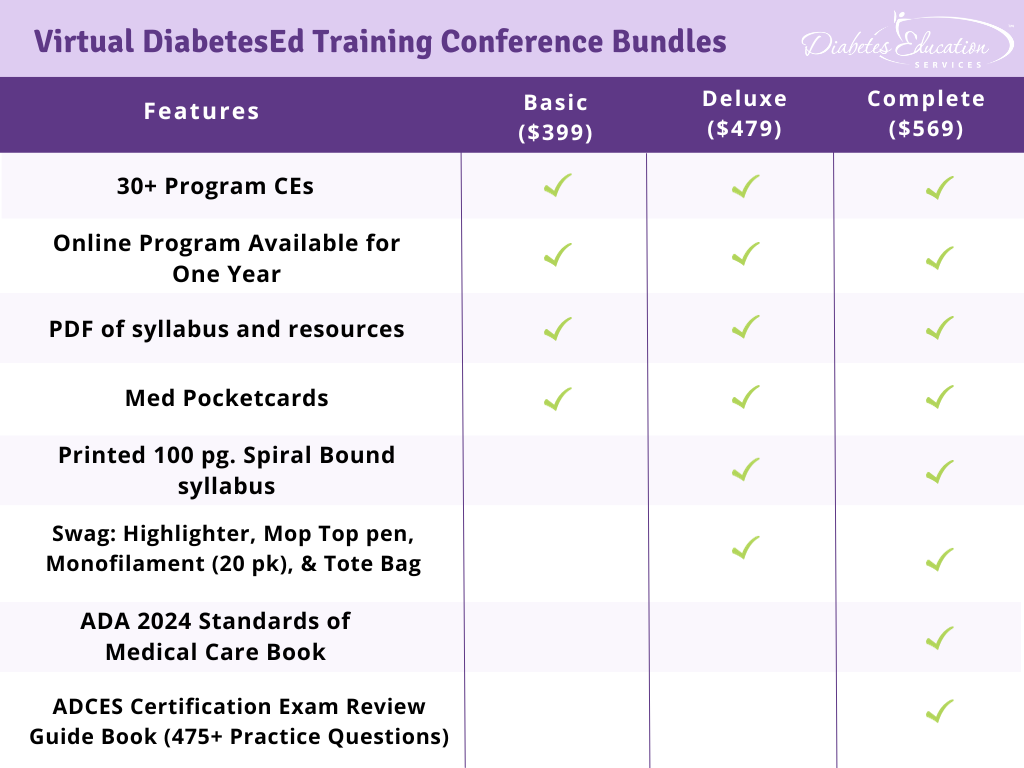
Sign up for Diabetes Blog Bytes – we post one daily Blog Byte from Monday to Friday. And of course, Tuesday is our Question of the Week. It’s Informative and FREE! Sign up below!
Accreditation: Diabetes Education Services is an approved provider by the California Board of Registered Nursing, Provider 12640, and our CPEU courses have received Prior Approval* from the Commission of Dietetic Registration (CDR), Provider DI002. Since our CPEU courses received Prior approval* from the CDR, these CPEU courses satisfy the CE requirements for the CDCES /BC-ADM regardless of your profession!
The use of DES products does not guarantee the successful passage of the certification exam. CBDCE and ADCES do not endorse any preparatory or review materials for the CDCES or BC-ADM exams, except for those published by CBDCE & ADCES.

We love celebrating National Nutrition Month and the registered dietitian nutritionists who help us maintain the pleasure of eating while empowering us to make informed decisions about daily food choices.
We are honored to highlight the significant impact RDNs have on individuals, communities, and society as a whole by promoting healthy eating habits, preventing disease, and improving our overall quality of life by encouraging us to eat a rainbow of foods filled with fiber and phytonutrients.
In this newsletter, we explore different types of plant-based diets and recognize that accumulating evidence supports the benefits of this approach, including the prevention of type 2 diabetes. We include lots of additional resources to explore and share.
Next, Coach Beverly shares a personal story about confronting weight stigma during a provider visit. She asks readers to raise awareness in their settings and advocate for weight-inclusive and respectful care for each individual.
We share Mohammed Ali’s “Recipe for Life” as we consider including this recipe and all of its’ ingredients in our daily lives.
Our guest contributor, Nick Kundrant, provides insights into the transformative power of a positive mindset based on his book, “Positively Type 1”. His message of empathy, resilience, and a holistic approach to health care is inspiring, Thanks, Nick!
Finally, we are excited to announce our “Connect with Coach Beverly” live Facebook event on March 13th! Test your knowledge with our nutrition-inspired Questions and Rationales of the Week!
Sending notes of joy and health,
Coach Beverly and Bryanna
Featured Articles
Upcoming Webinars
Upcoming Events – See the complete calendar listing

Join Coach Beverly and Team for two and a half days of knowledge-sharing, fun, and “aha” moments for our Virtual DiabetesEd Training Conference April 17th – 19th, 2024.
Attendees will leave this conference with new tools and a refreshed understanding of the latest advances in person-centered diabetes care. Our team highlights the ADA Standards of Care, medications, behavior change, technology, medical nutrition therapy, and more!
Our instructors co-teach the content to keep things fresh and lively.
Friend Discount: 3 or more only $449 per person. Email us at [email protected] with the name and email of each registrant to get the discount!

Accreditation: Diabetes Education Services is an approved provider by the California Board of Registered Nursing, Provider 12640, and our CPEU courses have received Prior Approval* from the Commission of Dietetic Registration (CDR), Provider DI002. Since our CPEU courses received Prior approval* from the CDR, these CPEU courses satisfy the CE requirements for the CDCES /BC-ADM regardless of your profession!
The use of DES products does not guarantee the successful passage of the certification exam. CBDCE and ADCES do not endorse any preparatory or review materials for the CDCES or BC-ADM exams, except for those published by CBDCE & ADCES.

For last week’s practice question, we quizzed participants on addressing sudden hyperglycemia due to cellulitis. 66% of respondents chose the best answer. We want to clarify and share this important information, so you can pass it on to people living with diabetes and your colleagues, plus prepare for exam success!
Before we start though, if you don’t want any spoilers and haven’t tried the question yet, you can answer it below: Answer Question
Question: RL is 83, has Latent Autoimmune Diabetes, and takes degludec 17 units every morning along with metformin 500 XR twice daily. RL tells you that their left leg was suddenly swollen and red, so they went to urgent care and were started on a course of antibiotics. In the meantime, their CGM is showing elevated blood sugars in the 200 to 350 range during the day but often less than 100 at night. RL weighs 70kg, with a BMI of 23.4.
Based on this information, what action do you suggest?
Answer Choices:
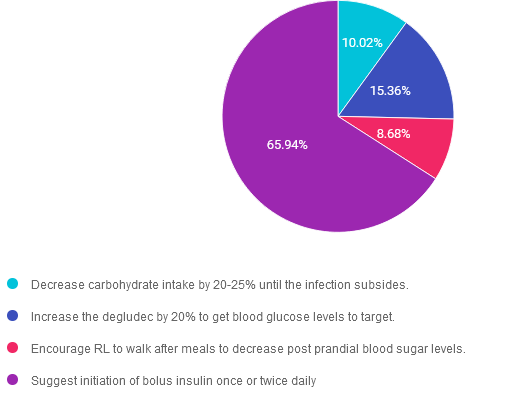
If you are thinking about taking the certification exam, this practice test question will set you up for success. Test writers anticipate possible answers based on the details in the question. They will wave those “juicy answers” right under your nose. Your job is to weed through the particulars, pluck out the most important elements and choose the BEST answer.
Answer 1 is incorrect. 10.02% chose this answer. “Decrease carbohydrate intake by 20-25% until the infection subsides.” Since RL has elevated glucose levels due to infection, drastically decreasing carbohydrate intake is not the best approach to manage glucose levels. We want to ensure RL has adequate nutrition given her infection and age.
Answer 2 is incorrect. 15.36% of you chose this answer. “Increase the degludec by 20% to get blood glucose levels to target.” It seems that RL needs more insulin to lower daytime glucose levels. However, RL is experiencing glucose levels less than 100 overnight, which puts them at risk of nocturnal hypoglycemia. If we increase basal insulin by 20%, this dramatic increase could cause a dangerous drop in overnight glucose levels and is not recommended.
Answer 3 is incorrect. About 8.68% of respondents chose this. “Encourage RL to walk after meals to decrease post prandial blood sugar levels.” Keeping active is always a good idea, but with blood sugars running 200-350 during the day, walking after meals won’t be enough to get glucose levels to target. Plus, it may not be safe to promote walking since they have an infection and a leg that is swollen and red.
Finally, Answer 4 is correct. 65.94% chose this answer. “Suggest initiation of bolus insulin once or twice daily.” YES, this the best answer. Counterregulatory hormones are released during periods of infection that contribute to insulin resistance and hyperglycemia. To get blood glucose levels to target, RL will need daytime bolus insulin to manage the hyperglycemia, which will promote healing. Of course, treatment with antibiotics will also help to lower glucose levels.
We hope you appreciate this week’s rationale! Thank you so much for taking the time to answer our Question of the Week and participate in this fun learning activity!

Join Coach Beverly and Team for two and a half days of knowledge-sharing, fun, and “aha” moments for our Virtual DiabetesEd Training Conference April 17th – 19th, 2024.
Attendees will leave this conference with new tools and a refreshed understanding of the latest advances in person-centered diabetes care. Our team highlights the ADA Standards of Care, medications, behavior change, technology, medical nutrition therapy, and more!
Our instructors co-teach the content to keep things fresh and lively.
Friend Discount: 3 or more only $449 per person. Email us at [email protected] with the name and email of each registrant to get the discount!

Sign up for Diabetes Blog Bytes – we post one daily Blog Byte from Monday to Friday. And of course, Tuesday is our Question of the Week. It’s Informative and FREE! Sign up below!
Accreditation: Diabetes Education Services is an approved provider by the California Board of Registered Nursing, Provider 12640, and our CPEU courses have received Prior Approval* from the Commission of Dietetic Registration (CDR), Provider DI002. Since our CPEU courses received Prior approval* from the CDR, these CPEU courses satisfy the CE requirements for the CDCES /BC-ADM regardless of your profession!
The use of DES products does not guarantee the successful passage of the certification exam. CBDCE and ADCES do not endorse any preparatory or review materials for the CDCES or BC-ADM exams, except for those published by CBDCE & ADCES.

For last week’s practice question, we quizzed participants on how to approach a person who does not want to be weighed during a quarterly diabetes appointment. 60% of respondents chose the best answer. If you are interested in learning more about the importance of providing weight inclusive care, this practice test question will set you up for success.
Before we start though, if you don’t want any spoilers and haven’t tried the question yet, you can answer it here: Answer Question
Question:
RS arrives at their quarterly diabetes provider appointment and the medical assistant walks them to the scale, in the clinic hallway, to get their weight. RS politely explains that they feel uncomfortable being weighed but they are happy to share their stated weight. The medical assistant once again encourages RS to get on the scale and reassures RS that they don’t need to look at or know their weight. RS sighs, takes off their shoes and reluctantly gets on the scale to be weighed.
Which of the following best describes the end result of this situation?
Answer Choices:
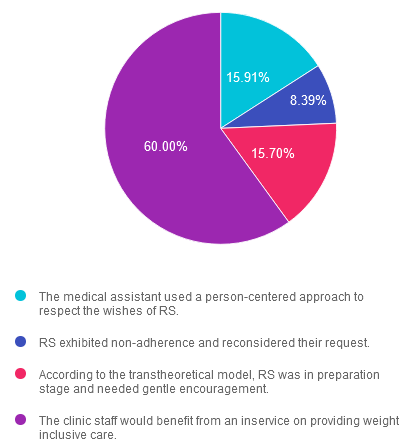
If you are interested in providing weight inclusive care, this practice test question will set you up for success. Your job is to weed through the particulars, pluck out the most important elements and choose the BEST answer.
Answer 1 is incorrect. 15.91% chose this answer. “The medical assistant used a person-centered approach to respect the wishes of RS.” Instead of honoring the request to not be weighed, the medical assistant insisted RS step on the scale. A person centered, weight inclusive approach would respect RS’s request not to be weighed and accepted their stated weight.
Answer 2 is incorrect. 8.39% of you chose this answer. “RS exhibited non-adherence and reconsidered their request.” People with diabetes have the right to be weighed in a private space and they also have the right to decline to be weighed. In this situation, RS’s weight is not required to provide safe and effective medical care.RS is not “non-adherent”, they are simply expressing their need not to step on the scale.
Answer 3 is incorrect. About 15.70% of respondents chose this. “According to the transtheoretical model, RS was in preparation stage and needed gentle encouragement.” This juicy answer does not reflect the situation in the medical office at the scale. RS did not state that they were working on being comfortable with being weighed or that it would be helpful to be weighed. Instead RS told the MA twice that they don’t want to be weighed, but their request was not honored.
Finally, Answer 4 is correct. 60% chose this answer. “The clinic staff would benefit from an inservice on providing weight inclusive care.” YES, this is the best answer. If the staff were informed about weight inclusive care and reducing weight stigma, they would have honored RS’s request not to be weighed and documented their stated weight. This inclusive approach would help RS feel seen, heard and respected. RS would gain a positive association with their medical team and be more likely to return for future appointments.
We hope you appreciate this week’s rationale! Thank you so much for taking the time to answer our Question of the Week and participate in this important learning activity!
 Enjoy our blog – Untangling Weight Stigma at Medical Visits.
Enjoy our blog – Untangling Weight Stigma at Medical Visits.Sign up for Diabetes Blog Bytes – we post one daily Blog Byte from Monday to Friday. And of course, Tuesday is our Question of the Week. It’s Informative and FREE! Sign up below!
Accreditation: Diabetes Education Services is an approved provider by the California Board of Registered Nursing, Provider 12640, and our CPEU courses have received Prior Approval* from the Commission of Dietetic Registration (CDR), Provider DI002. Since our CPEU courses received Prior approval* from the CDR, these CPEU courses satisfy the CE requirements for the CDCES /BC-ADM regardless of your profession!
The use of DES products does not guarantee the successful passage of the certification exam. CBDCE and ADCES do not endorse any preparatory or review materials for the CDCES or BC-ADM exams, except for those published by CBDCE & ADCES.

Ramadan is observed by Muslims worldwide as a month of fasting (sawm), prayer, reflection, and community. The common practice is to fast from dawn to sunset. The pre-dawn meal before the fast is called the suhur, while the meal at sunset that breaks the fast is called iftar. This year, Ramadan starts on Sun, March 10th and ends Tuesday April 9th, 2024. This question of the month addresses supporting individuals with diabetes during periods of religious fasting.
The 2024 Standards of Care reported individuals who fast have an increased risk for hypoglycemia, dehydration, hyperglycemia, and ketoacidosis.
Which of the following is an accurate health care statement regarding recommendations for religious fasting?
Click Here to Test your Knowledge
Question of week contributed by Christine Craig, MS, RD, CDCES, winner of the 2023 Impact on Diabetes Award, is a leader in the field of nutrition, technology, and diabetes care. Her years of expertise combined with her person-centered approach and work ethic, make her a perfect Question of Week author for this nutrition and activity focused content.

Class Topics & Webinar Dates:
Intended Audience: This library of critical information is designed for individuals or groups of diabetes specialists, including RNs, RDs, Pharmacists, Nurse Practitioners, Clinical Nurse Specialists, Physician Assistants, and other health care providers interested in staying up to date on current practices of care for people with diabetes and preparing for the BC-ADM or the CDCES certification Exam.
Can’t make it live? No worries. We will send post the recorded version to the Online University within 24 hours of the broadcast
Instructor: Beverly Thomassian RN, MPH, CDCES, has been Board Certified in Advanced Diabetes Management for over 20 years. She is an Associate Clinical Professor at UCSF, a working educator, and a nationally recognized diabetes expert. She has a Master’s Degree in Public Health from UCLA, with a focus on behavioral health and education.
Christine Craig, MS, RD, CDCES, winner of the 2023 Impact on Diabetes Award, is a leader in the field of nutrition, technology, and diabetes care. Her years of expertise combined with her person-centered approach and work ethic, make her a perfect speaker for this nutrition and activity focused content.
Sign up for Diabetes Blog Bytes – we post one daily Blog Byte from Monday to Friday. And of course, Tuesday is our Question of the Week. It’s Informative and FREE! Sign up below!
Accreditation: Diabetes Education Services is an approved provider by the California Board of Registered Nursing, Provider 12640, and our CPEU courses have received Prior Approval* from the Commission of Dietetic Registration (CDR), Provider DI002. Since our CPEU courses received Prior approval* from the CDR, these CPEU courses satisfy the CE requirements for the CDCES /BC-ADM regardless of your profession!
The use of DES products does not guarantee the successful passage of the certification exam. CBDCE and ADCES do not endorse any preparatory or review materials for the CDCES or BC-ADM exams, except for those published by CBDCE & ADCES.